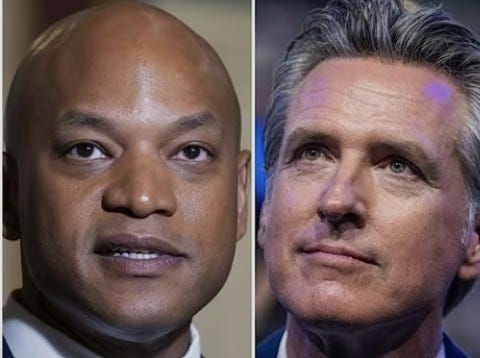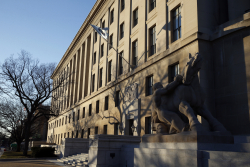The U.S. is a nation of symbols: the bald eagle, the Statue of Liberty, baseball, apple pie. One symbol, however, has taken a beating lately, though it represents the core of the American project.
Lady Justice predates the founding, but her likeness—blindfolded, holding scales and a sword—stands for the principles that the Founders insisted should rule the American legal system. While her spirit pervades the Constitution, it is most prominently featured in the Fifth Amendment's promise of due process: the principle that those accused of wrongdoing have the right to challenge the evidence against them before the government takes away their liberty.
But not everyone who swore to uphold the Constitution is keeping that promise. "If you violated the law, you are not entitled to due process," Rep. Victoria Spartz (R–Ind.) said in a March town hall. In April, Sen. Mike Lee (R–Utah) posted an image on X that encouraged travel to Canada. "We won't throw you into an El Salvadorian [sic] gulag without due process!" the image read. "[The U.S.] absolutely will," Lee responded. Tom Homan, Trump's border czar, was asked on ABC if people sent to El Salvador had any due process. "Where was Laken Riley's due process?" he replied, referring to the Georgia nursing student who was murdered by Jose Ibarra, an immigrant who was in the country illegally and was convicted and sentenced to life without parole for the murder.
Homan's non sequitur sums up the current debate, sparked by the Trump administration sending hundreds of Venezuelans it alleges to be gang members, without due process, to the Centro de Confinamiento del Terrorismo (CECOT), a massive prison in El Salvador. That nation's president, Nayib Bukele, declared a state of emergency over three years ago and suspended basic civil liberties, such as the right to a fair trial.
Questions about whether the administration is indeed expelling only dangerous gang members arose after CECOT received the men, the vast majority of whom have no criminal record. That includes, among others, Andry José Hernández Romero, a Venezuelan makeup artist who appears to have been flagged because he has two crown tattoos, and Kilmar Armando Abrego Garcia, whom the Trump administration illegally sent to CECOT due to what it says was an "administrative error."
To argue that Riley's murder, tragic though it was, justifies skirting due process fundamentally misunderstands the purpose of the doctrine. It is not to excuse criminal behavior, but to ensure that accusations—especially when they carry life-altering consequences—are publicly tested by evidence and judged fairly.
Homan's logic would see due process abolished. It need not apply, he says, in the face of serious allegations or unsympathetic individuals, which is contrary to why the Founders demanded its inclusion in the Constitution. They knew the power of the state was dangerous. The government doesn't always get it right. "Because we said so" isn't sufficient reason to abrogate anyone's liberty.
That the prisoners sent to CECOT were not citizens is irrelevant. The Supreme Court has repeatedly confirmed that even those suspected of being in the U.S. unlawfully are entitled to due process of law. And the people in question were not merely deported—they were sent without charge or conviction to a notorious megaprison, where Kristi Noem, the secretary of the Department of Homeland Security, has said she hopes the men are kept for life.
Is it possible that Hernández Romero, Abrego Garcia, and others are members of a gang? It is. It is also possible they are not. Consider that one man Noem attempted to deport narrowly made it to a hearing before she could do so because the plane malfunctioned—and the government was not able to produce any evidence that he was a member of the Tren de Aragua gang, according to his attorney. Justice should not be reduced to vengeance, and constitutional rights should not be treated as privileges, revocable at a politician's whim.
A country that claims to value liberty cannot shed the process meant to protect it. If due process is no longer sacred, neither is justice; and if some of us do not have due process, then none of us do. Trump has defined himself as someone who fights for American values: "Make America Great Again." You cannot do that by discarding one of the core values that made the U.S. exceptional.
The post As American as Due Process appeared first on Reason.com.













 Bengali (Bangladesh) ·
Bengali (Bangladesh) ·  English (United States) ·
English (United States) ·